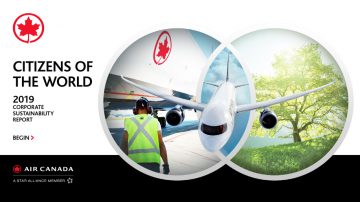
New climate change commitments expected to be made by UK Prime Minister Boris Johnson this week will set a legally binding target of cutting UK emissions by 78 per cent by 2035 compared with 1990 levels. The BBC reports that the government has accepted the advice of its independent Climate Change Committee (CCC) to adopt the emissions cut.
Interviewed on the BBC Radio 4 Today programme, Professor Myles Allen, the head of Oxford University’s climate dynamics group, said that the UK would have to “… move to a model where carbon dioxide is treated like as waste product like any other and if you are going to sell products that generate carbon dioxide you have an obligation to get rid of the carbon dioxide that they generate.”
It is possible to sequestrate carbon dioxide, for instance, underground, but this is expensive, meaning that if airlines were forced to account for those costs, then the price of tickets would rise.
“The fundamental principle has to be established that if you are going to use a product, you should pay to clean up after yourself. Now, if when we cost in the cost of disposing of the carbon dioxide, which would add hundreds of pounds to the cost of a flight across the Atlantic, people decide to fly less, that makes sense. It doesn’t mean you have to ban flying entirely, it just means it will go back to costing what it did in the Seventies and Eighties.”
The aviation industry has been quick to point out how it aims to get to net zero, through more efficient aircraft, the use of sustainable aviation fuels (SAF) and by carbon offsetting, but raising prices to account for the cost of carbon dioxide emissions is not part of airline plans.
Sixth Carbon Budget: CCC lauds historic milestone on path to Net Zero UK
The UK’s decision was welcomed by NGO Transport & Environment (T&E).
Matt Finch, UK policy manager at T&E, said: “We congratulate the Prime Minister for taking this key step on the path to decarbonise planes and ships. Properly accounting for the emissions is essential, but we now need meaningful action to control greenhouse gas releases and prevent future emissions rising above pre-pandemic levels. In the process the UK can become a world leader of zero-emission fuels for planes and ships.”
Andrew Murphy, aviation director at T&E, said: “The UK is showing how to take responsibility for its climate impact. The EU should incorporate aviation and shipping in its Climate Law or relinquish its aspiration for climate leadership. If the UK, with an economy so reliant on aviation and shipping, can do this then Europe has no excuses.”
The UK is responsible for the third highest amount of CO2 emissions from aviation globally, behind only the United States and China. Globally, aviation is responsible for 5 per cent of global warming. Shipping accounts for about 13 per cent of greenhouse gas emissions from European transport.












